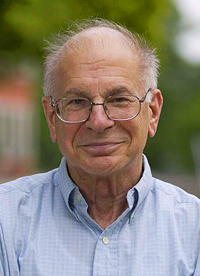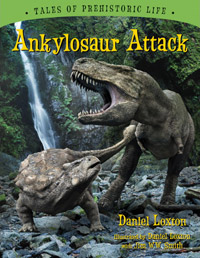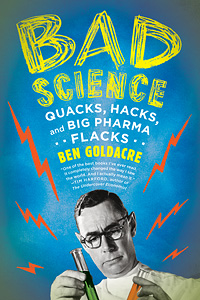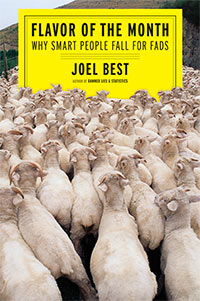In this week’s eSkeptic:

Skepticality
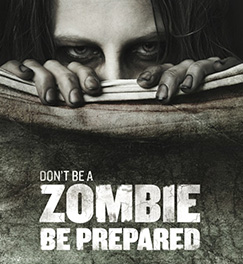
Interview with David Daigle
This week on Skepticality, Derek interviews David Daigle, a leading member of the Centers for Disease Control and Prevention (CDC) preparedness team to talk about the CDC’s ‘Be Prepared’ Zombie campaign which has been rolling out since May 2011. Daigle relays information about how the CDC keeps track of upcoming threats to citizens be it a pandemic, food contaminations, and even disastrous massive storms.
MonsterTalk
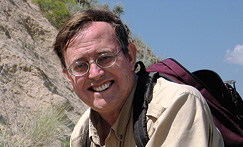
Crypt O’ Zoology:
Dinosaurs in Africa!
From The Lost World to Alley Oop to The Flintstones, the idea of dinosaurs and humans living together has captured the imagination of readers across the globe. But there are some who believe that this idea isn’t fictional. Is there a population of sauropod dinosaurs living in Africa in modern times?
In this episode of MonsterTalk, we interview paleontologist Dr. Donald Prothero at TAM9 about his research into the creature known as Mokele Mbembe! Cryptozoology, paleontology and creationism converge in the jungles of the Congo.

NEW ON MICHAELSHERMER.COM
Transhumanism, the Singularity and Skepticism
Michael Shermer is interviewed about his views on the future of Artificial Intelligence, the technological singularity, transhumanism, and skepticism. This is not something that Michael Shermer usually talks about. Michael also spoke at the Singularity Summit in the US this year (2011). Footage was taken at the 2011 Think Inc conference in Melbourne.
The Decline of Violence
Can anyone seriously argue that violence is in decline? They can, and they do—and they have data, compellingly compiled in a massive 832-page tome by Harvard University social scientist Steven Pinker entitled The Better Angels of Our Nature: Why Violence Has Declined, which Michael Shermer discusses in his October Skeptic column in Scientific American.
Our next lecturer: Daniel Kahneman
Thinking: Fast and Slow
Sunday, November 6, 2011 at 2 pm
Baxter Lecture Hall
THE IDEAS OF THE PRINCETON UNIVERSITY PSYCHOLOGIST DANIEL KAHNEMAN, recipient of the Nobel Prize in Economic Sciences for his seminal work that challenged the rational model of judgment and decision making, have had a profound and widely regarded impact on psychology, economics, business, law and philosophy. Until now, however, he has never brought together his many years of research and thinking in one book. In the highly anticipated Thinking, Fast and Slow, Kahneman introduces the “machinery of the mind.” Two systems drive the way we think and make choices: System One is fast, intuitive, and emotional; System Two is slower, more deliberative, and more logical…
Tickets are first come, first served at the door. Seating is limited. $8 for Skeptics Society members and the JPL/Caltech community, $10 for nonmembers. Your admission fee is a donation that pays for our lecture expenses.
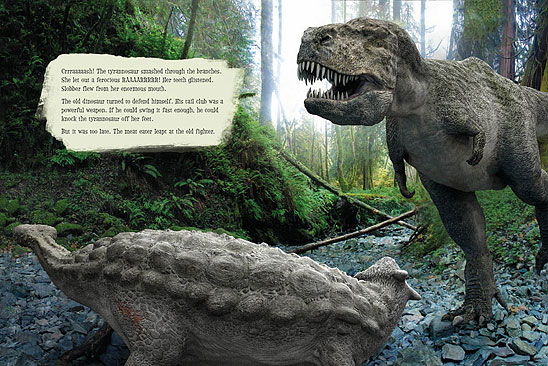
NEW FROM DANIEL LOXTON
ON SKEPTICBLOG.ORG
Ankylosaur Attack Art Demo
from the Vancouver
International Writers Festival
Upon his return from the 2011 Vancouver International Writers Festival, Daniel Loxton shares a peek at the image compositing process used to create the photorealistic dinosaurs in his latest book, Ankylosaur Attack!
JREF Recruits Zombie Horde to Carry Psychic Challenge
Daniel blogs about a recent protest action by our colleagues over at the James Randi Educational Foundation, who enlisted a group of zombies to make a serious consumer protection point. Led by JREF President D.J. Grothe, the undead brought the JREF’s Million Dollar Challenge to alleged spirit medium James Van Praagh.
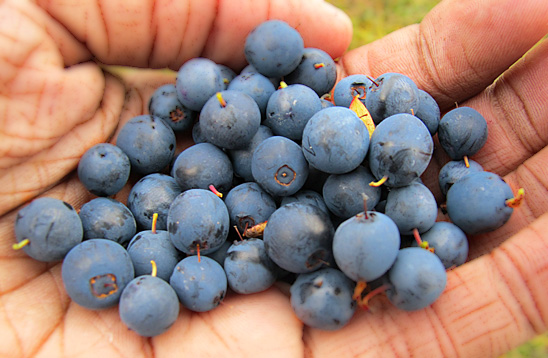
About this week’s eSkeptic
In this week’s eSkeptic, Harriet Hall, M.D. (a.k.a. the SkepDoc) takes a look at antioxidants. What are they? How do they work? How much is enough? What happens when we ingest more antioxidants than we need? Is the excess excreted? Does it just sit there doing nothing? Does it do something we didn’t intend? And, if they’re so good for us, wouldn’t more of them necessarily be better? Unfortunately, it’s a bit more complicated than that. Find out why. This article appeared in Skeptic magazine volume 16, number 4 (2011).
Antioxidants? It’s a Bit More Complicated
by Harriet Hall, M.D. (a.k.a. the SkepDoc)
I am getting very annoyed with antioxidants. Like Pavlov’s dogs, I’m becoming conditioned to flinch when I hear the word “antioxidant” because it is so often followed by oversimplifications, distortions, and partial truths. The hype is everywhere, in magazines, on the Internet, on the radio, in books, in stores. Antioxidants promise to prevent heart disease, cancer, cataracts, Alzheimer’s, and even wrinkles; they will make you live longer and keep your mind sharp, along with making you feel young again. Well who wouldn’t want that? Every day I am bombarded with recommendations for foods, supplements, and skin creams that are “a good source of antioxidants,” “high in antioxidants,” or “anti-aging” products. Everyone knows antioxidants are wonderful. Everyone except for skeptical scientists who realize it’s a bit more complicated than that.
Antioxidants prevent oxidation. Oxidation is the process whereby oxygen atoms combine with other substances. When oxygen combines with iron, we call it rust. So what is “rusting” in our bodies? Free radicals or reactive oxygen species (ROS) are molecules or ions that have an unpaired electron that is desperately seeking to complete a pair. Normal metabolism creates free radicals like superoxide and hydroxyl radicals. They are necessary for life; we need them for killing bacteria, for cell signaling processes, and other functions. But since free radicals will react indiscriminately with anything, they can also cause damage, for instance by reacting with DNA to cause mutations. Oxidative stress (an excess of free radicals) has been linked to cancer, heart disease, and many other disorders; but it’s not always entirely clear whether it is a cause, a result, or an innocent bystander that just came along for the ride. Some people think it is accumulated damage from free radicals that makes us grow old and die prematurely; they assume that suppressing the damage with antioxidants would increase our life span.
We need a few free radicals to function properly, but an excess of them can wreak havoc. Our bodies know better than to let havoc reign unchecked. They produce neutralizing enzymes like superoxide dismutase, catalase, and peroxidases to keep the free radical population under control. They make use of the antioxidant vitamins A, C, and E in our food, and they produce metabolites like bilirubin and uric acid with antioxidant properties.
We can do our part to maintain our bodies’ defenses by insuring an adequate dietary intake of nutrients. But can we, should we, do more? How much is enough? Should we take supplements? It’s seductive to think we could improve on nature and prolong our lives. If antioxidants are good, wouldn’t more antioxidants necessarily be better?
Unfortunately, it’s a bit more complicated than that. As Ben Goldacre explains in his book Bad Science,
Human biochemistry is a vast interlocking web. An intervention in one place can have quite unexpected consequences; there are feedback mechanisms, compensatory mechanisms. Rates of change in one localized area can be limited by quite unexpected factors that are entirely remote from what you are altering, and excesses of one thing in one place can distort the usual pathways and flows, to give counterintuitive results.
Darn! Pseudoscience and marketing are so easy and straightforward and black and white; why does real science have to be so difficult?
What happens when we ingest more antioxidants than we need? Is the excess excreted? Does it just sit there doing nothing? Does it do something we didn’t intend? It would be nice to know.
There is good evidence that people who eat more fruits and vegetables are less likely to develop cancer, heart disease, and other ailments—and are likely to live longer. It’s easy to assume that the antioxidants in fruits and vegetables are responsible, but that might not be true. Other components of these foods (such as flavonoids) or the mixture of components in the diet might be responsible. Or maybe people who eat less fruit and vegetables are eating more of something else that causes those diseases.
If antioxidants in food do reduce the incidence of those diseases, it’s only logical to think that antioxidant supplements would reduce the incidence even more. Unfortunately, controlled studies have consistently shown that they either have no effect or make things worse. It’s not the first time reality has rudely intervened to spoil a great idea. Study after study has shown no benefit of antioxidants for heart disease, cancer, Parkinson’s disease, Alzheimer’s disease, or longevity. One study did show that an antioxidant combination slowed the progression of established moderate-to-severe macular degeneration, but more research is needed to confirm those results.
Early observational studies suggested that vitamin E supplements reduced the risk of heart disease. I remember reading a report from a cardiologist back when the enthusiasm was at its height. He and his partners had been blithely prescribing high doses of vitamin E for their patients and taking it themselves. After they and many of their patients developed flu-like symptoms, it finally dawned on them that they were experiencing toxic effects from vitamin E overdose. They cut back on the dosage, but kept using it. Subsequently, better studies showed harm rather than benefit. Subjects taking vitamin E supplements were more likely to develop heart failure.
Antioxidant supplements can cause damage. They can be toxic in high doses, can bind to minerals in the diet and prevent their absorption, and can increase the risk of lung cancer. One study was terminated early because of a 46% higher rate of lung cancer deaths in those taking beta-carotene. Post-menopausal women who took vitamin A supplements had more fractures. Some studies have shown an increase in colorectal adenomas. There are reasons to think antioxidants might interfere with some cancer treatments.
An analysis of 68 trials with a total of nearly a quarter of a million subjects found that antioxidant supplements increased the mortality rate. Some experts think that antioxidant supplements have been adequately tested and found not to help; believers argue that the studies may not have tested the right substances or used the optimal doses.
The “superfood” industry has capitalized on the antioxidant craze. The recipe is simple: Pick a fruit, preferably something exotic and tropical. Claim it is a superfood with unique benefits. Develop a concentrate, a pill, or a mixture with other special ingredients. Advertise it with claims that can sneak by FDA restrictions. Solicit testimonials; make them up if necessary. Get several of your friends to try it so you can claim it is “clinically tested.” Start a multilevel marketing company. Charge exorbitantly high prices. Make big bucks. Noni juice, açaí berry, mangosteen, goji, camu camu; even the less exotic green tea, blueberries and pomegranates have generated fortunes. The superfoods concept involves a fallacy. These fruits don’t offer any benefits that you can’t get from components of a normal healthy diet. The fact that they contain high levels of a nutrient is meaningless, since you can get the same amount by eating more of other foods that contain lower levels. One 650mg Tylenol doesn’t work any better than two 325mg pills.
All kinds of antioxidant supplement mixtures are sold. Each claims unique benefits but supports those claims with testimonials rather than with real evidence. Some depend on a gimmick such as a unique proprietary manufacturing process or better absorption. They may claim a synergistic effect from a certain combination of ingredients, but these claims are never supported by published studies. How did they decide to combine those specific ingredients? Did someone in the company employ intuition or use a dartboard?
One anti-aging product, Protandim, claims to act by a different approach. It “persuades your body to increase its own production of antioxidants” and is alleged to “help prevent free radical damage to your cells thousands of times more effectively than any conventional antioxidant therapy… slowing down the rate of cell aging to the level of a 20 year old.” What’s in it? Milk thistle, bacopa, ashwagandha, green tea extract and turmeric. Hmm…and how exactly does this particular combination persuade your body to increase its production of antioxidants?
How do they know it works? They have a grand total of one study in humans: it showed an increase in a TBARS (ThioBarbituric Acid Reactive Substances) blood test. They have one study showing that it reduced the incidence of skin cancers in mice. They have a couple of other studies in mice and in test tubes. They have zero evidence of clinical effects in humans, much less of extended life span. But they have lots of testimonials and you can sign up to become a distributor.
Be wary of claims based on improvements in lab tests. There are many of these, like TBARS and ORAC (Oxygen Radical Absorbance Capacity) scores; you can even buy a home urine test to measure lipid peroxide levels. The same substance may show either pro-oxidant or anti-oxidant effects, depending on which test you choose. The human body is a more complicated environment than a test tube. None of these in vitro tests have been validated as corresponding to in vivo antioxidant effects or to any clinical benefit. Products with high TBARS levels have not been shown to improve patient outcome by any objective measurements. Vitamin E, which we know is a powerful antioxidant in the body, has a very low ORAC score.
Antioxidants are important for health, but so are free radicals. We need to know a lot more before we can confidently recommend increased antioxidant intake for everyone. The American Heart Association doesn’t recommend taking antioxidant supplements; they’re waiting until better evidence becomes available. For now, they say what Mom said: “Eat your vegetables.” That’s prudent advice for other health reasons too; it’s a slam-dunk.![]()
Skeptical perspectives on alternative and experimental medicine …
-
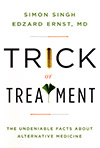 Trick or Treatment: The Undeniable Facts About Alternative Medicine
Trick or Treatment: The Undeniable Facts About Alternative Medicine
by Simon Singh & Edzard Ernst
-
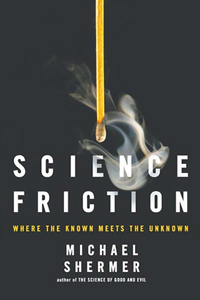 Science Friction: Where the Known
Science Friction: Where the Known
Meets the Unknown
by Michael Shermer


